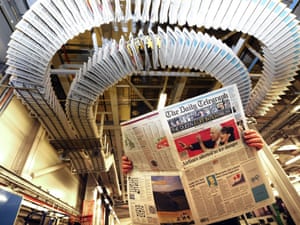A Marxist perspective would argue that the so called "information revolution" has done little to benefit audiences or to subvert the established power structures in society. Far from being a "great leveller" (Krotoski 2013) as many have claimed, it has helped to reinforce the status quo by promoting dominant ideologies. The most popular news website in the UK by a considerable margin is the 'Mail Online', which receives more than 8 million hits every month and is continuing to expand rapidly - with forecasts that it will make $100 million or more in digital revenues in the next three years. Similar to its tabloid print edition, the website takes a conservative, right-wing perspective on key issues around gender to passively accept what the Marxist theorist, Gramsci, called a hegemonic view. When one of their chief columnists, Jan Mior, wrote a homophobic article about the death of Stephen Gately in 2009 there were twitter and Facebook protests but, ultimately, they did not change the editorial direction of the gatekeepers controlling the newspaper.
However a pluralist perspective would argue the audience holds the control therefore they are benefited by the media. Audiences are able to "conform, accommodate or reject" issues in the media meaning they have the free will to do what they want which opposes the Marxist perspective. This is supported by Castells who says "technological blossoming of the culture of freedom, individual innovation and entrepreneurialism" is occuring. The events of the Arab spring from December 2010 to December 2011 shows this as protests were recorded and displayed on-line through citizen journalism which allowed the basis for user generated content to be developed as social media websites helped distribute the footage. Countries such as Egypt, Libya and Tunisia were all involved- Tunisia is where it began as a man set fire to himself as his food cart was seized by the police resulting in riots by young Tunisians; this influenced other Arab countries to rebel against the government leading to various changes by the government. As people within the audience are able to capture this information it can be argued that power is in their hands rather than the institutions.
Marxists tends to emphasise the role of the mass media in the reproduction of the status quo, in contrast of liberal pluralists who emphasise the role of the media in promoting freedom of speech. another perspective to argue that audiences are not empowered through the development of the new and digital media would be that the dominant social class rile the media. Gramscis theory of hegemony would reinforce that there dominant media conglomerates and leaders feed audiences the necessary information, for example, Rupert Murdoch. Additionally, Marxist believe that a 'minority of media producers always love a majority of consumers' (Pareto's Law), due to the exploitation of power for so consumers, this means that they are becoming oppressed as they have no say over these media producers, d the web pages and blogs are like a million monkeys typing nonsense (Andrew Keen) - colt of the amateur.
Pluralists is a theory that believe that we have a classless system. This isn't the way to go as many people and theorists believe that we do have a class system that sets many people in different places. For example you have stereotypical views, class views etc. I think that there is a class system as people are known for their class. for example, all rich upper-class people know each other, which means that they are set in their ways to make sure that they get what theory want. In olden days many people believed that class was important and many people still in this day believe. The upper class would only work with upper class and poor/working class would only work with each other as well. The upper class would hire the lower class to be their servants or to be their skivvy as they believed that the upper class was better than them. This isn't entirely true of how the system works now. But you can tell that their are systems that still act in this way at times. There is always going to be a class system to define who you are and Marxists believe that.
Against Marxists.There shouldn't be a class system. The class system is bad and its not needed for many reasons like in the previous paragraphs. This means that there needs to be some change to make sure that the system doesn't keep being like this. Also, Marxists believe that mass media companies are controlling everyone and that people listen to whatever is in newspapers and on the news. This can sometimes be true in what they say-but many people believe everything which can cause many problems as not everything you see and hear is true. You can get other opinions or read other things to ensure that you are getting the right information needed in order to believe something or want to understand something.
Marxists believe that everything should go in a specific way and should be. For example, "The simple idea is that the policy process, far from being a rational weighing up of alternatives, is driven by powerful socio-economic forces that set the agenda, structure decision-makers choices, constrain implementation and ensure that the interests of the most powerful (or of the system as a whole)determines the outputs and the outcomes of the political system" (Peter John, Analysing Public Policy, 1999.) This quote is showing that there is a view from the system that everyone should see and understand as its something that can happen and is happening. Its saying that whatever comes out of the system determines what we think and do. I think this is true as we do listen to the news and read newspapers a lot which show that we understand and what we are processing we are going to believe as its on a specific and powerful website or page.
Galtung and Ruge explain how journalists select material as "newsworthy" which is by considering factors such as whether it is recent, culturally close to us or about elite people. All these factors can be easily discovered on the internet even before a news story is created meaning they interest the audience.News institutions serve to please the audience as they select information that will inform/entertain them. For example an article published on "Netflix and chill" on the Guardian media would interest the younger generation it is a commonly used phrase for them meaning they are shaping the news around them. Pluralists would agree that "the internet has given readers much more power. The world is changing and newspapers have to adapt."- Rupert Murdoch, this is actually occurring hence why such childish stories are being published, simply to entertain the audience. Opinion leaders are who provide the hegemonic views and use social media sites such as Twitter to transmit their ideologies but as the two-step flow model suggests, individuals actively choose whether or not they agree with their hegemony.
An example of a Marxists view is Alain de botton. He believes and supports the view that the media is powerful and believes that they should be in power all of the time. this means that the media should tell us what to do and suck us in to doing what they want and when they want. For example they say "it can change the law". This means that the media is so powerful that it can change the law which is in more power than the media will ever be, but as the media has footage and evidence to show different things about different views they can expose it on social media or in the news/tabloids to show everyone and then the views will change.
Both Marxist and pluralist are related as they explain what the media does the audience and how institutions are impacted by the decisions they make. There are both positive and negative effects of the internet and other developments in new and digital media but overall it has provided a more positive outcome for the audience as they are able to express their own views much more clearly. In conclusion, I think that they are both views that we need to take into account as its something that we can get and understand certain things from. There isn't a wrong or right answer to this but only a matter of opinion. Some information that Marxists say and some of what pluralists say should be something that we can get information from both and understand it more. Having this can make the society we live in better. There are points from both arguments that I believe in.











